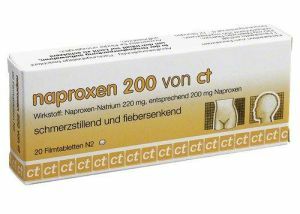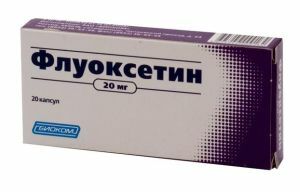 Fluoxetine is an antidepressant that belongs to the group of selective inhibitors. This tool is prescribed for obsessive and depressive states.
Fluoxetine is an antidepressant that belongs to the group of selective inhibitors. This tool is prescribed for obsessive and depressive states.
The drug is available in capsules of 10 and 20 mg. Fluoxetine is produced by the brands Kanon, Lannacher, Ozone, etc. In one capsule contains 22 mg of fluoxetine hydrochloride and the following auxiliary components:
- corn pregelatinized starch( 185 mg);
- dimethicone( 2mg).
The capsule body consists of titanium dioxide, gelatin and yellow oxide.
Contents
- Pharmacological profile
- Indications for use
- Fluoxetine for weight loss
- Contraindications to use
- Instruction for use
- Overdose cases
- Special instructions
- Interaction with other drugs
- Practical experience with
- Medication cost
Pharmacological profile
The drug is a derivative of propylamine. The pharmacological action consists in partial suppression of the reuptake of serotonin. As a result, the concentration of the drug in the synaptic cleft increases and its effect increases.
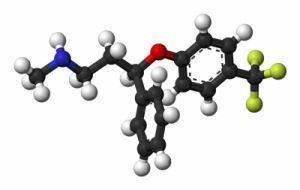
Fluoxetine hydrochloride formula
The active substance of the medication eliminates anhedonia, reduces tension, anxiety and feelings of fear. Fluoxetine does not have a toxic effect on the human body and does not provoke the appearance of orthostatic hypotension. The desired therapeutic effect occurs in one to two weeks.
The drug has minimal effect on the metabolism of acetylcholine, dopamine and norepinephrine. Especially effective in obsessive-compulsive disorders and endogenous depression. After intake, dysphoria is eliminated and the mood improves. The pronounced therapeutic effect with depression is observed after 2-4 weeks of admission, and with compulsive disorders - after 5 weeks.
The drug is well absorbed from the digestive tract. At the first passage through the liver, all components undergo a weak metabolic process. The process of taking food does not affect the degree of absorption, but slows its speed. The highest degree of saturation of the drug in blood plasma is achieved after six to eight hours after its use. In this case, the medication should be continuous( for several weeks).
The level of ability to bind to proteins is 94%.The process of metabolism takes place in the liver in the form of demethylation, with the formation of norfluoxetine( the main active metabolite).The half-life of the drug is 2-3 days after a single dose. With long-term use of fluoxetine, this period is 5-6 days.
The medication is excreted mainly by the kidneys: 11.6% in the unmodified state, 7.4% in the form of fluoxetine glucuronide, 46% in other compounds, 20% in the form of hippuric acid. With improper functioning of the kidneys, the process of excretion of metabolites is significantly slowed down. When the dialysis is performed, the drug is not taken out at all. This is due to the huge volume of distribution and the high degree of binding to plasma proteins.
The effectiveness of the drug was noted even with such disorders as: anorexia nervosa and diabetic neuropathy.
The mechanism of action of the drug is based on the selective inhibition of reverse blocking of serotonin at the sites of neurotransmitter transmission. The drug is able to have a timoanaleptic and stimulating effect. After a single dose, the feeling of anxiety and fear decreases, but the drug does not have a complete soothing effect.
Indications for use
Fluoxetine is effective in the following disorders:
- depression accompanied by fears;

- bulimia, in this case the agent is used as a component of complex psychotherapy;
- obsessive-compulsive disorder;
- premenstrual dysphoria;
- is a bulimic neurosis;
- prolonged alcoholism;
- bipolar disorder;
- schizophrenia and schizoaffective psychosis;
- obsessions;
- is resistant to depression.
Fluoxetine for weight loss
Fluoxetine tablets are used not only to treat depression, but also to lose weight. Under the influence of the drug, the appetite decreases, as a result of which the medication has been used to reduce weight.
The maximum daily dose in this case should not exceed 80 mg.
In cases where the cause of excess weight is a depressive condition( bulimia), the effect of the drug will be as natural as possible and the work of the internal systems of the body will not be disrupted.
Reviews of those who lose weight with Fluoxetine show that this drug is really effective and helps to lose weight, but the functions of other body systems are violated.
Contraindications to the use of
Contraindications to the use of fluoxetine:
- hypersensitivity to the components of the drug;
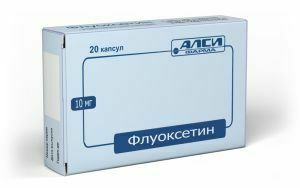
- chronic renal failure;
- period of bearing of the child and thoracal feeding;
- atony of the bladder;
- adenoma of the prostate;
- presence of diabetes mellitus;
- presence of liver disease;
- manifestation of decompensated epilepsy;
- manifestations of convulsive reactions;
- children and teenagers( under 18 years);
- period of use of MAO inhibitors.
Instruction for use
Antidepressant Fluoxetine is intended for internal administration, regardless of the time of meal, the dosage of the drug is prescribed based on the type of disease:
- Depressive states .Initially, the daily dose is 20 mg per day. In this case, the medication should be taken only in the morning. Over time, the dose of the drug can be increased to 40-60 mg per day. But in this case, the dose of the medicine should be divided into two or three doses. In acute need, the daily dose rises to 80 mg per day( for three doses).
- Bulimic neurosis .The daily dose of the drug is 60 mg for two or three doses. The drug can be used by patients of different ages. Data on the change in the dose of the drug based on the age of the patients are absent. In old age, fluoxetine therapy starts at a dose of 20 mg.
- Obsessive-compulsive disorder .The initial dose is 20 mg. Over time, the dose increases to 60 mg per day.
Cases of overdose
Overdosage Fluoxetine has the following side effects:
- dizziness and frequent headaches;
- nausea and diarrhea;
- decreased visual acuity;
- increased sweating.
If one of the above symptoms occurs, it is necessary to rinse the stomach and take activated charcoal.
When convulsions should take tranquilizers and conduct symptomatic therapy. Overdose occurs when the daily dose is exceeded( 80 mg).
Special instructions
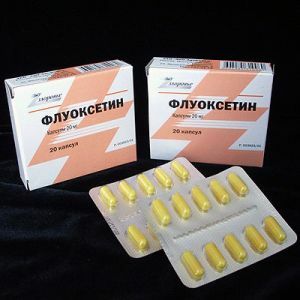 Fluoxetine is contraindicative when consuming alcohol. In case of impaired renal and liver function, treatment should be started at half the recommended dose. In this case, it is necessary to increase the interval between taking the medication.
Fluoxetine is contraindicative when consuming alcohol. In case of impaired renal and liver function, treatment should be started at half the recommended dose. In this case, it is necessary to increase the interval between taking the medication.
Also, the drug is not recommended during pregnancy and lactation. Fluoxetine is not prescribed for children and adolescents until the age of eighteen.
The prescription of a medication for diabetics can cause hypoglycemia. After a course of therapy with MAO inhibitors, the drug can be used only after fourteen days. Treatment of patients with a deficiency of body weight may lead to an anorexic effect.
Interaction with other drugs
It is not recommended to take fluoxetine with MAO inhibitors concurrently, as this can lead to the appearance of a serotonergic syndrome. Parallel use with tryptophan increases the serotonergic properties of the drug.
The intake of drugs with St. John's wort also causes a serotonergic effect and intensifies the manifestation of adverse reactions.
Simultaneous use with central-action drugs provokes suppression of CNS functions and increases the risk of side effects.
Practical experience of using
Reviews of doctors and people taking or taking Fluoxetine.
The drug is very effective, but I always prescribe it with extreme caution due to side effects. It helps with a depressive condition.
Anatoly Valentinovich, doctor, psychotherapist
In my medical practice, I use this drug quite recently and did not observe any side effects in my patients. I never prescribe it for weight loss.
Angelina Markovna, doctor neurologist
I rarely take medication, but the latest events in my life made my brain just boil. After going to a therapist, I started taking Fluoxetine one capsule per day( 20 mg).After eight days of use, I felt significant improvements in my health.
Alina
I took the drug for the purpose of therapy of depression, at the same time and lost a little weight. From pobochek manifested only headache and loss of appetite. I took this drug for about a month and even others noticed that I changed a lot. All nervousness disappeared, and I became mentally strong and healthy person.
Galina
Practice and experience in the use of patients shows that the drug is strong enough and effective. Therefore, take it with caution. The disadvantages include the manifestation of a large number of undesirable reactions.
Cost of medicine
Fluoxetine is produced in capsules( 10-20 mg) and is released in blisters and packs, the average price for the drug ranges from 37 to 65 rubles.
The medication should be stored at room temperature( 15-30 degrees), in a dry place. Shelf life of the drug is three years from the date of manufacture.
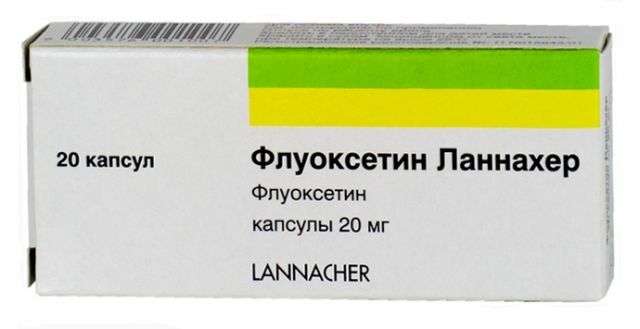
Fluoxetine is dispensed in pharmacies only on prescription from the doctor.



